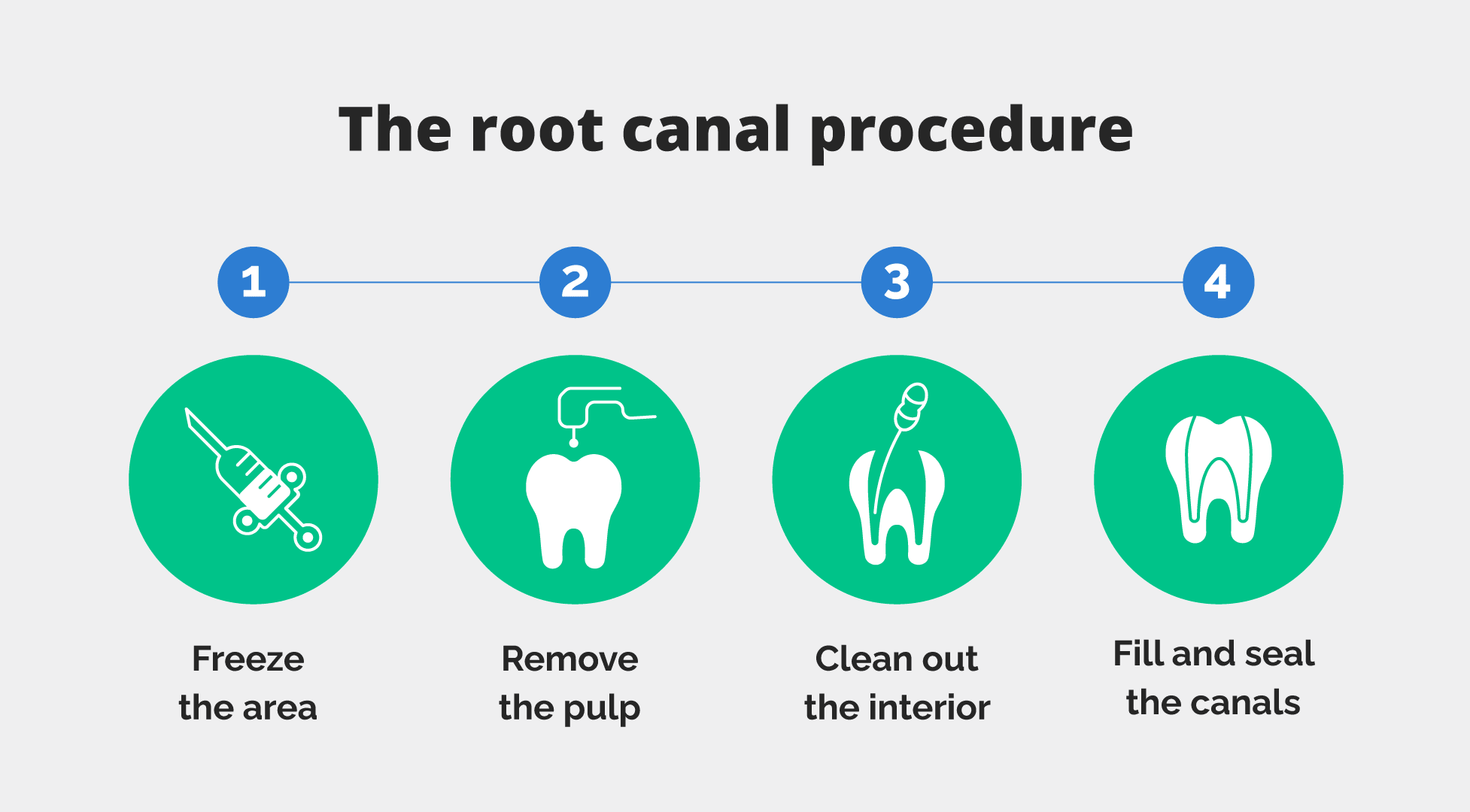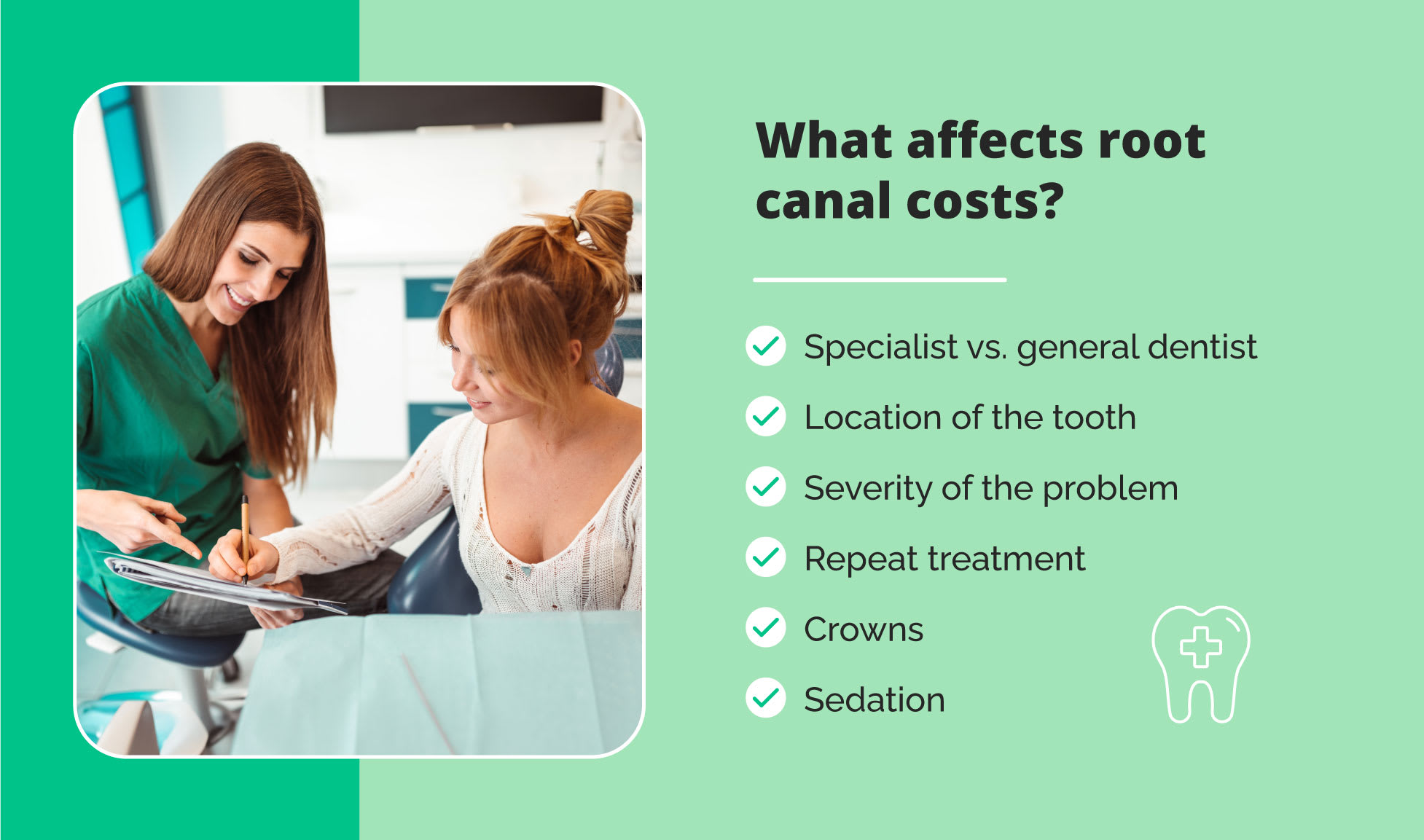
The average root canal cost in Canada is between $500 and $800+, but this may differ depending on a variety of factors like the number of root canals needed and which teeth you need them on. There may be other costs associated with your root canal, such as additional procedures — like crowns or sedation.
No one likes to hear the phrase “root canal” at the dentist’s office. However, root canals can be necessary for correcting tooth problems and preserving that perfect smile you’ve worked so hard for.
The amount you pay as a patient for a root canal in Canada can vary based on multiple factors, like your province, your insurance plan, the severity of your issue, and more. As a result, it’s best to have a prior understanding of root canal costs in Canada so your bill doesn’t catch you off guard.
In this post, we’ll break down root canal costs by location, other elements that may affect the cost of your root canal, and how insurance factors into the amount you pay out of pocket.
What is a root canal?
A root canal is a common dental procedure used to address decayed or infected teeth. Rather than extracting the tooth, dentists access the inner root of the tooth to clean and disinfect its canals, hence the name “root canal”.
The root canal procedure itself is fairly straightforward. When performing a root canal, your dentist or endodontist will:

- Freeze the area around the affected tooth
- Remove the pulp
- Clean the interior
- Fill and seal the canal and tooth with a crown or filling
After the procedure, it’s essential to follow good oral hygiene to avoid a second root canal.
How much does a root canal cost in Canada?
Although the average cost of a root canal in Canada typically falls between $500 and $800, the final amount can fluctuate based on various factors, including your location, the specific tooth requiring treatment, and the number of root canals necessary.
In Canada, root canal costs are often higher in large cities and can also vary depending on the specific tooth and the difficulty of access. Here’s a breakdown of root canal costs by province:
| Root canal cost by province | |
| Province | Average cost for one root canal |
| Alberta | $761-$1,062+ |
| British Columbia | $595-$635+ |
| Manitoba | $562-$663+ |
| New Brunswick | $600-$700+ |
| Newfoundland and Labrador | $669-$817+ |
| Nova Scotia | $540-$648+ |
| Ontario | $696-$825+ |
| Prince Edward Island | $550-$750+ |
| Quebec | $645-$709+ |
| Saskatchewan | $633-$775+ |
*Data not available for Northwest Territories, Nunavut, and Yukon. Costs are based on the 2023 fee guides.
While the costs above represent a single root canal, it's not uncommon to require multiple root canals, possibly even four or more. Keep in mind that the total cost of your root canal may vary based on the specific tooth and the severity of the issue.
| Two canals | $700-$1,200+ |
| Three canals | $1,000-$1,300+ |
| Four or more canals | $1,100-$1,650+ |
Factors that affect root canal cost
While the tables above illustrate typical root canal costs in Canada, many factors impact the final billed amount. A few of these factors include:
Specialist or general dentist
When you need a root canal, you’ll either go to a general dentist or a specialist. While specialists and general dentists can perform the same procedures, specialists typically pursue additional education to specialize in specific areas of dentistry. The Canadian Academy of Endodontists defines an endodontist as “a root canal specialist with two or more years of advanced training, has received a certificate in endodontics from a specialized education program accredited by the Canadian Dental Association, and limits his/her practice to endodontics.”
Some endodontic clinics will require a referral from a general dentist before scheduling an appointment and may charge slightly higher fees.
Location of the tooth
The cost of your root canal is influenced by the location of the tooth. Front teeth, which are thinner and have less pulp, usually result in less complicated and less expensive procedures. Additionally, due to the reduced amount of pulp, these procedures tend to be less painful and have shorter recovery times.
Severity of the problem
The severity of the root canal will also affect the price you pay for a root canal. If it’s a prolonged problem, and the tooth has more significant decay, then the procedure can be more expensive than if the tooth decay is treated early.
If the tooth has decayed to a certain point, you may be in a situation where getting a tooth pulled, also known as an extraction, is the best option.
Repeat treatment
If you’re getting a repeat treatment on the same tooth, the procedure will be more complicated and expensive. With repeat treatments, you’ll typically get a crown rather than a filling since the first filling failed. This can be a more time consuming, complex, and expensive procedure. Additional technology with a practce, such as a 3D printers can reduce the time to create the crown though.
Crowns
You may need a dental crown procedure after your root canal, which is a separate procedure and a separate cost. In Canada, a single crown typically costs between $700 and $1,200 or more.
Crowns serve as support after a root canal and work to restore the tooth's shape. If you have a root canal on a tooth you commonly use for chewing, like a molar, you’ll almost certainly need a crown procedure after your root canal.
Sedation
Opting for sedation during your root canal procedure will incur an additional charge. The cost of sedation is typically determined by how long you are sedated and the type of sedation administered.
In Canada, the cost of conscious sedation using nitrous oxide or general anesthesia is calculated based on units of time, with each unit representing 15 minutes or less. For sedation, the price for a single unit typically falls within the range of $46 to $65+, while general anesthesia requires two units, costing between $260 and $317+.

Questions to ask your provider
If your provider tells you that you need a root canal, it’s essential to get as much information as possible to understand the overall cost. Here are a few questions:
How many root canals do I need?
Remember that your price will depend on the number of root canals you need. When you hear “root canal,” ask your provider how many root canals you require — and on which teeth.
What happens if I can’t afford a root canal?
Dental offices frequently provide financing options or payment plans for individuals who cannot cover the full cost of the recommended procedure upfront. If you are can’t afford the entire root canal treatment at once, discuss potential payment plans with your provider, tailored to your budget. Some dental offices may also partner with companies offering interest-free financing.
How urgent is a root canal?
While you have the option to compare prices for procedures like braces or other less urgent dental treatments, it's crucial to address root canals promptly. Delaying a root canal can result in the gradual worsening of infection or decay, potentially necessitating tooth extraction and the subsequent placement of a dental implant— a considerably more expensive procedure than a root canal.
Does insurance affect what you’ll pay for a root canal?
While root canal costs can appear daunting, especially if you're in a province with higher prices or require a more complex procedure, there's an option to consider: private dental insurance.
If you’re worried about covering the expenses of costly dental procedures like root canals, exploring private dental coverage can provide you with financial peace of mind. Root canals may be an expensive necessity, but they play a crucial role in maintaining your oral health. Investing in private dental insurance ensures you can stay on top of dental procedures without enduring financial stress. Learn more about dental insurance.
Conclusion
Many factors can contribute to the price you pay for a root canal, so it’s always good to research beforehand and ask your dentist questions.
If you have any questions about the root canal procedure or root canal costs, always ask your provider about the specifics of the treatment. Gathering as much information as you can about the procedure can help alleviate concerns, ensuring you can manage your oral care with confidence and peace of mind.
Remember, the content of this post is for informational purposes only and is not intended as medical or dental advice. For advice tailored to your specific circumstances, please consult your primary care physician or dental provider.
Sources:
- American Association of Endodontists (AAE) (1)
- American Association of Endodontists (AAE) (2)
- Hellodent (1)
- Healthline
- Hellodent (2)
- Dentalcorp
- Government of Canada
Dental guides referenced:
- Alberta
- British Columbia
- Manitoba
- New Brunswick
- Newfoundland
- Nova Scotia
- Ontario
- PEI
- Saskatchewan
*The content provided in this article, including text, graphics, and referenced material, is intended for informational purposes only and is not a substitute for professional dental advice, diagnosis, or treatment. Always consult with your dentist or another qualified oral health professional for questions regarding your dental condition. Never disregard professional dental advice or delay seeking it based on information from this article. If you believe you have a dental emergency, contact your dentist, or seek immediate assistance from an oral healthcare professional.


